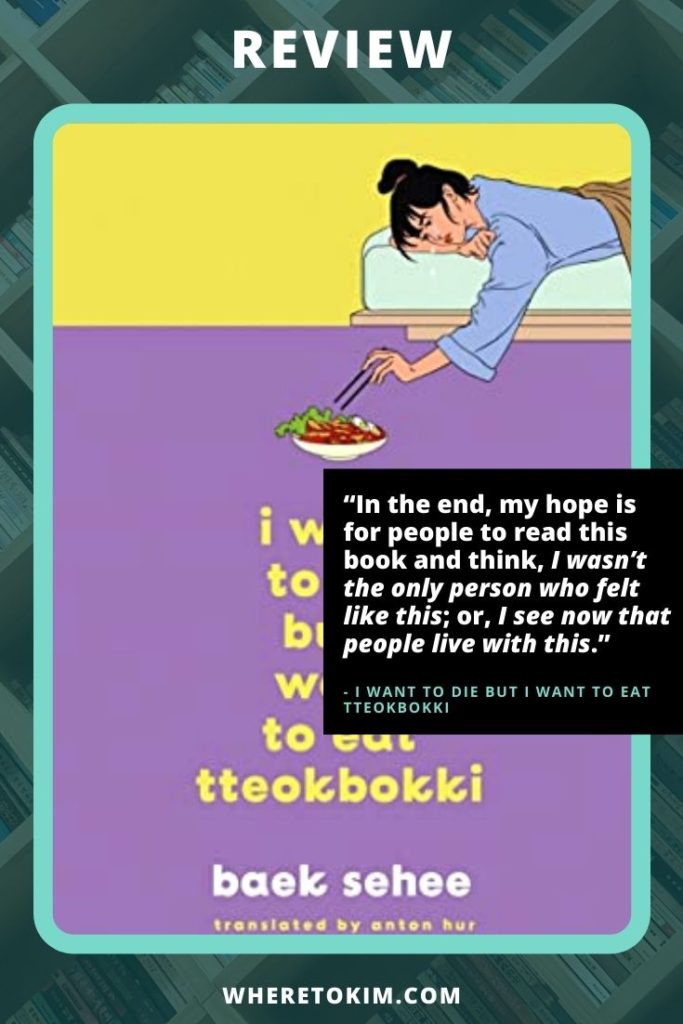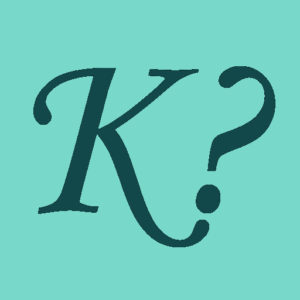I Want to Die But I Want to Eat Tteokbokki by Baek Se-hee is a collection of dialogues and essays about the author’s experiences with dealing with depression, anxiety and dysthymia.
Location: South Korea
I Want to Die But I Want to Eat Tteokbokki synopsis
The phenomenal Korean bestseller recommended by BTS’ RM
I’m so odd, even to myself.
I wonder about others like me, who seem totally fine on the outside but are rotting on the inside, where the rot is this vague state of being not-fine and not-devastated at the same time.
Baek Se-Hee is a successful young social media director at a publishing house when she begins seeing a psychiatrist about her – what to call it? – depression? She feels persistently low, anxious, endlessly self-doubting, but also highly judgemental of others. She hides her feelings well at work and with friends; adept at performing the calmness, even ease, her lifestyle demands. The effort is exhausting, overwhelming, and keeps her from forming deep relationships. This can’t be normal.
But if she’s so hopeless, why can she always summon a yen for her favourite street food, the hot, spicy rice cake, tteokbokki? Is this just what life is like?
Recording her dialogues with her psychiatrist over a 12-week period, Baek begins to disentangle the feedback loops, knee-jerk reactions and harmful behaviours that keep her locked in a cycle of self-abuse. Part memoir, part self-help book, I Want to Die but I Want to Eat Tteokbokki is a book to keep close and to reach for in times of darkness.
Book review
I Want to Die But I Want to Eat Tteokbokki gives you an intimate look into the author’s feelings of depression and her dialogues with a psychiatrist. Before you pick up this book, think about why you want to read it. Is it because RM from BTS recommended it, or maybe because you are going through something similar to the author or just because you love tteokbokki and the title caught your attention. Your intention influences your expectations. What kind of takeaway are you looking for?
I can’t judge the way depression is described, but I can describe what it makes me feel as a reader eager to experience why this book is a bestseller.
Comparing contradictions
In the author’s dialogues with her psychiatrist, you read how her upbringing and love-hate relationship with her older sister led to low self-esteem and a tendency toward co-dependency in relationships. From the words of the very talkative psychiatrist, you can distill tips for improving interactions in your daily life, such as how to shift your perspective from other people’s pasts to your present and begin to perceive your personal experiences more clearly.
Over the course of twelve sessions, she learns that it is natural for contradicting feelings to exist – just read the book’s title – but that a black-and-white reaction to them might be a bit extreme. Another important lesson she tries to apply to everyday life is that you can show empathy and still share your own hardships without comparing who has it worse. Such things help you be more gentle with thoughts and judgments you have about your own interactions. Not everything has to be perfect.
Up and down (and up again?)
At first, I saw each chapter as an opportunity for self-reflection. In between the dialogues, the author shares some takeaways and at the end of the book you will find more self-reflections and thoughts on things in life. The dialogues are quite detailed and do not reflect the way someone naturally talks with interjections, rephrasing and colloquialism. This is done for a better reading experience, but does give the feeling of a conversation that has been edited to make a point. I do like the rare comments between brackets that convey the author’s thoughts on the therapy sessions.
At some point the dialogues start to get repetitive, but that is to be expected, as you can’t cure serious problems overnight. This led me to wonder what the book would have been like if there had been chapters on how the author applies the lessons to everyday life in a story form, making the book less dialogue- and essay-dependent. Somewhere halfway through, my interest dwindled. This may be different for you if your experience or expectations are more in line with the author’s. For everyone else, this is not an entertaining story or a generic self-help book, but rather an account of someone’s personal journey and her thoughts on it.
Compared to the essays at the end, the dialogues seem lighter because they show progression. I wonder if all the essays should have been placed before the dialogues or in between, so that the book ends with her wish and her path of improvement, on a lighter note. Reading the last essays felt like ending in a downward spiral that even managed to affect my mood a bit.
"I see now that people live like this"
The author’s goal is as follows: “In the end, my hope is for people to read this book and think, I wasn’t the only person who felt like this; or, I see now that people live with this.” If this is what you need, read this book. I Want to Die But I Want to Eat Tteokbokki is first and foremost a collection of dialogues and essays about the author’s experiences dealing with depression, anxiety, and dysthymia. I appreciate the candor with which the author wrote this book. It takes a lot of courage because new people she meets will now know these things about her, which can be a good or a bad thing depending on how she deals with her co-dependency.
I did have a takeaway of my own, namely a reminder that I would very much like to prioritize my dreams over my reality. But all change is hard, and it is incredibly difficult to change behavior and find the courage to give up stability and everything else that is familiar. That’s something I live with.
Interested?
Buy your copy of I Want to Die But I Want to Eat Tteokbokki from Amazon (available 23 June 2022).
Book details
Title: I Want to Die But I Want to Eat Tteokbokki
Author: Baek Se-hee
Translator (from Korean): Anton Hur
Language: English
Publisher: Bloomsbury Publishing Plc (UK & ANZ)
Pages: 208
ISBN (13): 9781526650863
Publication date: 23 June 2022
About the author and translator
Born in 1990, Baek Se-hee studied creative writing in university before working for five years at a publishing house. For ten years, she received psychiatric treatment for dysthymia (persistent mild depression), which became the subject of her essays, and then I Want to Die, but I Want to Eat Tteokbokki, books one and two. Her favorite food is tteokbokki, and she lives with her rescue dog Jaram.
Anton Hur was born in Stockholm, Sweden. He is the winner of a PEN Translates grant, a PEN/Heim Translation Fund grant, a Daesan Foundation grant, a GKL Korean Literature Translation Award, and multiple LTI Korea and Publication Promotion Agency of Korea grants. His translations include Kyung-Sook Shin’s The Court Dancer (Pegasus Books), Kang Kyeong-ae’s The Underground Village (Honford Star), Sang Young Park’s Love in the Big City (Grove Atlantic, Tilted Axis), and Bora Chung’s Cursed Bunny (Honford Star) as well as stories in Words Without Borders, Asymptote Journal, Slice Magazine, Litro, Anomaly, and others. He has taught at Seoul National University, the Ewha University Graduate School of Translation and Interpretation, Yonsei University, and the Literary Translation Institute of Korea, and was a Translator in Residence at the National Centre for Writing in Norwich, UK as well as the Queen’s College Translation Exchange at the University of Oxford. He currently divides his time between Seoul and Songdo (Incheon).
Many thanks to Bloomsbury Publishing and NetGalley for a digital ARC of this novel in exchange for an honest review.







